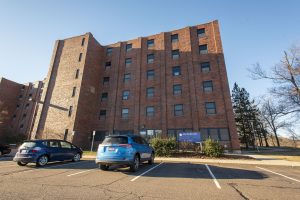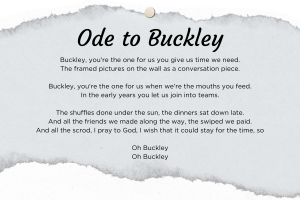There are words that Jacob Lasek says he lives by – “Someone is looking up to you, don’t let that person down” might just be his favorite, a proverb he says he embodies every day in the music department.
But there are a handful of others he keeps close, too, pinned under the clear case around his cellphone, and declaring things like “Focus on your long-term goals, success is soon yours” and “Be content with your lot. One cannot be first in everything.”

It’s sage advice that Lasek ’26 (SFA) has collected from a basket of fortune cookies in Buckley Dining Hall, a place that’s like a close friend to him and so many others in the School of Fine Arts – no wonder those adages are dear.
Dakota Earley-Dyer ’26 (SFA) and his friends started a group chat when they were freshmen to arrange their regular, pretty frequent, trips to the dining hall just across the street from the Music Building in the south corner of campus.
BuckyBrekky, the chat’s official name, has morphed into just a regular group text stream, but it’s important to note, he says, that it started because of that special place and continues to pay homage.
“Personally, I like going there between Marching Band and Pep Band rehearsals,” Ashton Tyler ’25 (SFA) says. “Pep Band is high intensity and Marching Band has rehearsals outside and then inside. For brass players, you’re pretty much playing until you can’t play anymore, and, for me playing the trumpet, having Buckley as a place to regroup and sit with all your friends is reenergizing.”
Most music majors can easily tell you their favorite memory or what they like best about Buckley, though, Mark Paine ’25 (SFA) might just be the most unique of the lot.
He wrote a song about it, “Ode to Buckley,” a sentimental tune formed with a ditty he had in his head for a while and just didn’t yet have a place for, that questions where music students will eat when the hall closes later this spring.
‘Where will they go, where can they go, to get what we had’
John Buckley Residence Hall was built and named in 1969 after its eponym, a Stafford native who grew up in Union, was a UConn trustee for 14 years from 1926-40, and served as a U.S. attorney under two presidents.
Today, the hall houses only Honors students, alongside its neighbor Shippee Residence Hall, but in different stints through the years was open to all students and often was the place School of Fine Arts students landed, thanks to its proximity to the Fine Arts Complex.
“I always found it interesting when I was over there that in the middle of the day you could hear the trumpets from across the street because the music students were rehearsing,” Executive Director of Dining Services Michael White says. “I always thought that was a pretty cool thing about Buckley.”

As with many dorms at UConn, Buckley was built with a dining hall and at one time was carpeted – yes, it once had carpet, White says – but not much else has changed in 55 years.
White says the service area has been switched around some and minor upgrades have been done, but largely it looks the same, save most notably the addition of solid, thick-lacquered, sturdy pine tables, chairs, and benches, a hallmark of the place, about 15 years ago.
In the early days of UConn, students generally ate where they lived, keeping the number of people at each hall in line with roughly the number of people living in the building. Both Shippee and Buckley had dining halls, for instance, even though they’re right next to each other.
The number of students that Buckley served rose when Shippee’s dining hall closed in the 1990s. But when South Dining Hall opened in 1999, Buckley’s patronage began to drop off, White says. Downtown Storrs started to take shape between 2012 and 2014, and eateries there gained popularity, further impacting its customer base.
Buckley shifted to a Monday to Friday schedule to compensate. It started hosting special events, like Calzone Night or a sliders bar, to draw people. It even catered to its Fine Arts base, nestling musical notes among the décor and piping in music – literally avant-garde jazz one afternoon.
With seating for 252 people, Buckley drew 358 for dinner one mid-February night this semester. By comparison, McMahon Dining Hall, with a capacity of 500, fed 1,672, White says.
Considering the price of food and cost of operations, the math works out to about $9 per transaction in all the dining halls, he says, with two exceptions – Gelfenbien Commons in Towers because the Kosher kitchen requires extra workers, and Buckley, where it’s $12 per transaction because of the facility’s age.
“There’s a small niche of students who love Buckley, and we know that,” White says. “They love its intimacy and its proximity to the Fine Arts Complex, but they’re not getting the best value from their meal plan. We try really hard for them, but Buckley is limited in space, equipment, and the potential for upgrades.”
Discussions about closing Buckley – just the dining hall; the residence hall will remain open – came with construction of the new dorm near Mirror Lake and in it the opening of a 500-seat dining hall, dubbed New South for now.
White says New South will have a juice bar, vegan and vegetarian sections, comfort food and grill stations, a massive salad bar, and a first for campus – a smoker and rotisserie section.
Dining Services hopes to move into New South this summer and, White says, the goal is to have it ready in time for the fall semester.
‘All the friends we made along the way, the swipes we paid’
When Paine heard in the fall that Buckley was closing, he took his nugget of a song and fleshed it out, drawing from the band Chicago for inspiration and adding lyrics and other musical parts – piano, saxophone, trombone, trumpet, electric guitar, electric bass, and drums.
He recruited a team of musicians from his ensembles and classes, people he’s shuffled across the street with for breakfast after 8 a.m. Harmony class or Piano with Kenneth Clark. And they practiced with a performance for their peers in mind.
All music students at UConn are required to participate in a weekly Convocation course – “Convo” for short – from 1:25 to 2:15 p.m. every Friday in von der Mehden Recital Hall. One might describe it as a departmental student meeting, a noncredit but required time to gather as a group.

“When I started at UConn it was actually twice a week,” Eric Rice, professor and department head, says. “The idea is that this is a venue for sharing student performances and for providing information that is important to music students but doesn’t get transmitted as part of a regular class.
“We had a session recently on musculoskeletal health, exercises that students can do to prevent themselves from getting too fatigued while practicing or performing. And at least once a year we do a session on hearing health, which is incredibly important for musicians,” Rice says. “Those are required by the National Association of Schools of Music, so as part of our reaccreditation we need to get this information to students.”
Also, during Convocation, Rice says he brings in professional musicians to give masterclasses and devotes one session per semester to hearing from students, a time when they can vent about empty soap containers in the downstairs bathroom, or rehearsal practice load, or anything else on their minds.
“Convocation has evolved quite a bit in the last 20 years,” says Rice, who is stepping down next year as the longest-serving music department head. “I’ve been leading the class for the past decade in my role as department head and I strove to build a sense of community.”
Part of doing that is fostering a supportive atmosphere.
Students are required to perform during Convocation at least four times while at UConn, twice as a soloist and twice as part of a chamber group. The last three or four Fridays of each semester are devoted exclusively to these performances – there are, after all, 175 student musicians here.
With approval from their applied music teacher – so, for instance, their clarinet instructor – students ready for these performances, which sometimes can be nerve-wracking, Rice explains, because many are used to performing as part of large ensembles with the protection and near anonymity that provides, not standing on stage alone for all to see.
Thus, the importance of that sense of community, friendship, and support.
Performances run the gamut, Rice says. A student might perform an acapella arrangement of a pop song. A group of tubists might offer an arrangement of Christmas carols. Students might very well perform a piece by Mozart or Brahms to get them ready for their juries, the semester-end solo performance in front of a panel of professors.
So, it wasn’t exactly unusual that Paine and his crew last semester performed “Ode to Buckley,” an original composition with a sweet, if not silly at times, feel. Paine notes in the lyrics of a perhaps not-so-much-favored dish: “And all the scrod, I pray to God. I wish that it could stay.”
Sarah DiMiceli ’24 (SFA) was setting up her drum set ahead of the performance, she says, when Rice asked her what the song was going to be like – keep in mind that one student held up a “Save Buckley” sign during an earlier Convocation.
“Like a breakup song,” she replied. “But it also has happy undertones in a way. Buckley has just had such a positive impact on all of us.”
Then, Chandler Creedon ’24 (SFA), who’s usually a saxophonist, asked Rice to borrow his microphone. He says Rice gave him a raised eyebrow, in a sort of “you’re singing?” kind of way.
And then they belted it out, with a standing ovation at the end.

‘The shuffles done under the sun, the dinners sat down late’
Rice says that at the end of each academic year, the department gives out a series of superlative awards as another way to build community and join together those who might sing or play, compose or perform.
“The Buckley Shuffle,” DiMiceli says, nodding her head as if she’s in on a gag. “So, the Buckley Shuffle is famous, and it’s been around for years.”
“I’m the reigning Best Buckley Shuffler,” Creedon proudly proclaims.
Rice describes the Best Buckley Shuffler award as “perhaps the most coveted,” determined through an online poll, much the same as the other awards.
“Best Buckley Shuffler is the student who most successfully jaywalks through Storrs Road traffic to get to Buckley and also gets back after having eaten,” Rice explains. “It’s just part of our culture among the music students.”
DiMiceli says that when music students whisper to each other, “Buck Shuff,” they all know that means “Wanna go?”
“I just really like the food at Buckley,” she says. “Chicken nugget day is a really great day. I’m also a big fan of the perogies with sweet potato.”
Colin Quigley ’25 (SFA) says Buckley is part of the tradition of being a UConn music student, and he’s heartened to see this year’s freshmen shuffling across the street after Ear Training class, just the same as he did.
“They all sit at one table, and they all just become great friends,” Quigley says. “It’s just been a constant for all of us.”
Rock versions of Christmas songs, Michael Jackson’s greatest hits in reggae style, the lyrics of “All Star” by Smash Mouth over the melody of a Taylor Swift song, all of which have been piped in overhead at one time or another, are just a few of the things that will be missed.
In the fall semester, Andrew Rozzi ’25 (SFA) says, one of the workers brought in their dog, Otis, and students ogled and roughhoused with the pooch after finishing their meals. It’s something, he suspects, he’s not likely to see at other dining halls.
The single peak fond memory for me – because it’s just so consistently very nice – is just sitting down with friends, that everyday kind of thing. That we can just go across the street and have fun, eat, talk. It has just good vibes, I suppose. — Mark Paine ’25 (SFA)
“The single peak fond memory for me – because it’s just so consistently very nice – is just sitting down with friends, that everyday kind of thing. That we can just go across the street and have fun, eat, talk. It has just good vibes, I suppose,” Paine says.
Having a place nearby is especially important to music majors, Paine explains, because perhaps more than other majors they’re in the same building for as long as 12 hours each day, with classes that start at 8 a.m., rehearsals that convene in the afternoon and evening, performances at night, and time in a practice room in between.
“The music major is a very physical major because you have to be present and doing the thing you’re in school to do. There’s not a lot of online work. It’s playing or singing or composing. So, a lot of the time, all our work gets done in this building. We’re here all the time,” Creedon says.
Lasek adds, “Just because of this group, we’re talking a lot about being music majors and our relationship with Buckley, but really it’s the entire School of Fine Arts. You could talk to a similar group of people on the other side of the building, in Dramatic Arts or Art and DMD in Bishop, and they’ll give you the same answers about Buckley. It’s very unifying across the whole school.”
Students who recorded “Ode to Buckley” are Mark Paine, composer/keyboard; Chandler Creedon, saxophone; Sarah DiMiceli, drums; Dakota Earley-Dyer, vocals; Jacob Lasek, electric bass; Andrew Rozzi, trombone; Ashton Tyler, trumpet; and Colin Quigley, electric guitar.


